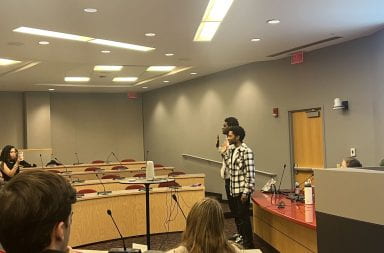
Demonstrators gather outside Bricker Hall, after the university issued a public safety notice for an assault against white students which was classified as a hate crime. Credit: Jack Long | Managing Editor for Digital Content
“You can shut your window, you can shut your blinds, but you cannot shut down the voices of your students,” Yondris Ferguson, a second-year in political science, said through a loudspeaker directed at Bricker Hall, home to the offices of university administration — including University President Kristina M. Johnson.
More than 100 demonstrators gathered outside Bricker Hall at 1:30 p.m. Tuesday to protest racial injustice and call for equal protection of all students. The protest was largely in response to a public safety notice that speakers said negatively impacted the perception of Black students on campus.
Johnson was in meetings for the majority of the protest, a staff member said.
The public safety notice, issued Sept. 3, was related to a pair of incidents classified under federal law as aggravated assaults and hate crimes near campus. Two suspects, who yelled racial slurs at the victims, were identified as Black in the notice. The victims’ race was not initially stated, but a university spokesperson later confirmed that the victims were white, and the notice was updated to include the victims’ race.
Protesters referenced comments on social media by white students in response to the public safety notice, including one that said people ought to arm themselves against “Black hoodlums.” The post and accounts have since been deleted.
Speakers asked demonstrators to email a list of demands to Johnson, Senior Vice President of Administration and Planning Jay Kasey and Director of Public Safety Monica Moll. The demands include calls for the university and the Department of Public Safety to “recognize their error and confusion in the handling of these incidents through a university-wide message.”
The list of demands also included calls for the administration to respond to the June 11 letter from the three student governments requesting the university cease on-campus operations and review off-campus contracts with Columbus Police after its handling of protests following the death of George Floyd over the summer.
“We begged this university to condemn the actions of the Columbus Police Department,” Roaya Higazi, a fourth-year in city and regional planning and Undergraduate Student Government President, said during the protest. “What makes you think they’ll condemn the actions of a student who is paid to be here?”
Speakers reminded the protesters to maintain social distancing throughout the gathering. COVID-19-related restrictions do not apply to gatherings for the purpose of expressing First Amendment speech, Johnson said in a university-wide email Aug. 11.
“The Black community of OSU organized this protest,” Destiny Brown, a fourth-year in political science and the protest’s first speaker, said. “This isn’t a specific person, this isn’t specific people, this is an entire Black community tired of our university continuously targeting us and putting us at the hands of racial violence with their rhetoric.”
Editor’s note: This story was updated at 4:04 p.m. Sept. 9 with clarification about the classification of the incidents.


